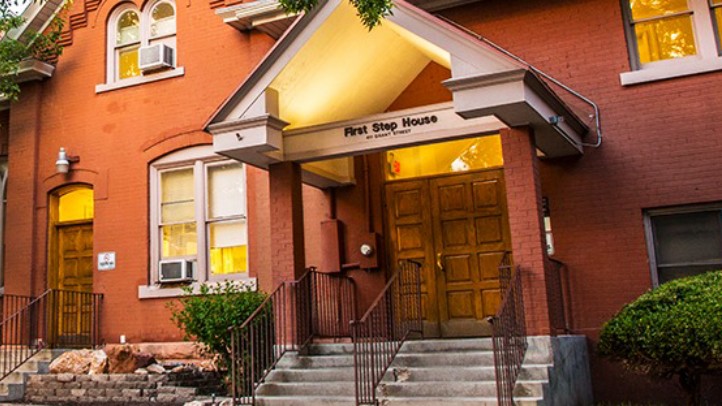First Step House Residential

About First Step House Residential
First Step House Residential in North Grant Street is a 76-bed residential recovery program for adult men diagnosed with substance use disorder and co-occurring mental health conditions. This is one of three residential recovery options First Step House offers in Salt Lake City, Utah. They serve veterans, individuals involved with the criminal justice system and the medically indigent population without financial resources to access quality care. This also includes men at risk of or struggling with homelessness. Individuals whose pattern of substance misuse poses a danger to them and to others are particularly prioritized.
Comfortable Accommodations for Recovery
The facility is fully furnished to optimize comfort, boasting dorm-style rooms, a professional kitchen and a group meeting room alongside common areas and laundry equipment. Clients are provided healthy meals three times daily while living onsite. Snacks are available throughout the day as well.
Clients benefit from the support of master ’s-level clinicians dedicated to helping them overcome substance dependence in a respectful and clinically efficient manner. These experts are trained in evidence-based practices and regularly update their knowledge to ensure they meet current standards.
Tailored and Evidence Based Residential Treatment
The program creates an interactive community space where you can achieve healing by engaging in treatment across multiple levels. Treatment is personalized to achieve the best recovery outcomes following a thorough intake assessment.
You’ll attend individual and group therapy alongside life skills classes and addiction education sessions. You’ll learn about the disease of addiction and its cycle, stages of recovery and warning signs of relapse.
You’ll also gain communication skills, stress/anger management and other practical tools that inspire sober living and relapse prevention programming. Therapists use a variety of proven techniques to help residents address patterns of negative habits that fuel substance use. These proven practices include rational emotive behavioral techniques, motivational interviewing and moral reconation therapy as well as shame resilience and dialectical behavioral methods.
They also offer relapse prevention programming and medication assisted treatment. This technique can particularly benefit those with opioid use disorder. It involves using FDA approved meds to curb physiological cravings and alleviate painful withdrawal symptoms.
Residents receive financial and employment counseling, attend outside support groups and complete therapeutic assignments during weekends and evenings. They also participate in job search, recreational activities and house chores. There are opportunities for medical and legal visits as well. Family members, friends, and other natural support networks may visit you while living on-site.
The program also involves peer support services and comprehensive case management. Your case manager helps you take care of secondary issues that may impede your lasting healing. They can coordinate with primary care providers to facilitate treatment for untreated medical and dental conditions.
They can offer supportive employment, transitional & permanent housing assistance and transportation and legal aid via linkage to community services. Addressing these issues ensures holistic recovery in which the physical, emotional and psychological needs of the patient are taken care of. Most residents transition to outpatient care for ongoing support upon graduation.
The facility also offers long-term recovery management following outpatient treatment. Most residents receive funding for treatment via Medicaid, Salt Lake County Behavioral Health Services or the US Department of Veterans Affairs.
| Levels of Care | Detox Service Setting | Programs | Payment Options | ||
|---|---|---|---|---|---|
|
Inpatient and residential programs provide round-the-clock medical and emotional support as you live at the treatment facility. This level of care may be recommended if you have severe addictions or mental health conditions since it removes outside distractions and allows you to focus solely on therapy. |
In outpatient therapy, you’ll attend therapy sessions several times each week while living at home. This is ideal if you have a strong support system and a lower risk of relapse. Outpatient treatment offers flexibility to maintain work, school or family obligations. |
Dual diagnosis programs address substance use disorders and co-occurring mental health conditions simultaneously. This integrated approach to care improves the likelihood of long term recovery and stability by addressing the root causes of addiction. |
Sober living homes provide a supportive and substance free environment for you to live in as you overcome your addiction. Residents must follow house rules and support each other's recovery journeys. Sober living fosters accountability and stability during this critical phase of recovery. |
||
|
Inpatient detox occurs in a dedicated treatment facility. You’ll live there around the clock and receive intensive medical support and supervision to help manage your withdrawal symptoms. It is suitable for individuals with moderate to severe addictions as it ensures a stable detox environment. |
Outpatient detox gives you access to medically supervised withdrawal services while still allowing you to live at home. You’ll attend a clinic for treatment and monitoring. This flexible option is suitable for those with mild to moderate withdrawal symptoms who have strong support systems. |
||||
|
Adult programs address the substance use and life challenges specific to adults. Therapists can deliver sessions in individual, group and family settings. Services often include job support and life skills training in a structured environment. |
Alcohol detox programs offer medical support to help individuals withdraw safely from alcohol. Your care team may use medications to ease your symptoms and provide medical monitoring to address complications. |
Drug detox programs support individuals who are withdrawing from addictive substances like cocaine and heroin. Medical support helps you manage symptoms in a controlled and safe environment so you can achieve initial sobriety. |
Men's programs address substance use while also considering the social pressures, family roles and mental health concerns that are specific to men. You’ll learn healthy coping mechanisms as you build emotional resilience and develop communication skills. |
Opioid detox uses medications to ease severe withdrawal symptoms. It also includes medical supervision to help you manage potential complications. These services allow you to stabilize and begin a recovery plan. |
Young adult programs are designed for individuals who are transitioning into adulthood. Topics of discussion typically include identity, independence and peer relationships. Providers may also offer life skills training and career support. |
|
Medicaid
|
Military Insurance
|
Private Insurance
|
Self Pay
|
Levels of Care
Inpatient and residential programs provide round-the-clock medical and emotional support as you live at the treatment facility. This level of care may be recommended if you have severe addictions or mental health conditions since it removes outside distractions and allows you to focus solely on therapy.
In outpatient therapy, you’ll attend therapy sessions several times each week while living at home. This is ideal if you have a strong support system and a lower risk of relapse. Outpatient treatment offers flexibility to maintain work, school or family obligations.
Dual diagnosis programs address substance use disorders and co-occurring mental health conditions simultaneously. This integrated approach to care improves the likelihood of long term recovery and stability by addressing the root causes of addiction.
Sober living homes provide a supportive and substance free environment for you to live in as you overcome your addiction. Residents must follow house rules and support each other's recovery journeys. Sober living fosters accountability and stability during this critical phase of recovery.
Detox Service Setting
Inpatient detox occurs in a dedicated treatment facility. You’ll live there around the clock and receive intensive medical support and supervision to help manage your withdrawal symptoms. It is suitable for individuals with moderate to severe addictions as it ensures a stable detox environment.
Outpatient detox gives you access to medically supervised withdrawal services while still allowing you to live at home. You’ll attend a clinic for treatment and monitoring. This flexible option is suitable for those with mild to moderate withdrawal symptoms who have strong support systems.
Programs
Adult programs address the substance use and life challenges specific to adults. Therapists can deliver sessions in individual, group and family settings. Services often include job support and life skills training in a structured environment.
Alcohol detox programs offer medical support to help individuals withdraw safely from alcohol. Your care team may use medications to ease your symptoms and provide medical monitoring to address complications.
Drug detox programs support individuals who are withdrawing from addictive substances like cocaine and heroin. Medical support helps you manage symptoms in a controlled and safe environment so you can achieve initial sobriety.
Men's programs address substance use while also considering the social pressures, family roles and mental health concerns that are specific to men. You’ll learn healthy coping mechanisms as you build emotional resilience and develop communication skills.
Opioid detox uses medications to ease severe withdrawal symptoms. It also includes medical supervision to help you manage potential complications. These services allow you to stabilize and begin a recovery plan.
Young adult programs are designed for individuals who are transitioning into adulthood. Topics of discussion typically include identity, independence and peer relationships. Providers may also offer life skills training and career support.
Contact

Chika Uchendu is a multi-niche and seasoned SEO writer with expertise in personal finance, technology and health. He’s had over 10 years of experience creating impactful content that resonates with diverse audiences. His journalism and digital marketing background enables him to combine data-driven analysis with engaging storytelling. This helps drive engagement and grants target audiences access to valuable information.
Chika has worked for Benzinga, Motley Fool, Webopedia and many other popular online media outlets on a freelance and contractual basis. He is using his voice to drive awareness and meaningful change among people dealing with the pandemic of substance use disorder. Chika is an ambivert who enjoys sports, hiking, reading and video gaming.

Courtney Myers writes and edits professionally from her home in North Carolina. She holds an MS in Technical Communication from N.C. State University and has worked in proposal management, marketing, and online content creation. She specializes in creating resources related to behavioral health and addiction recovery.




